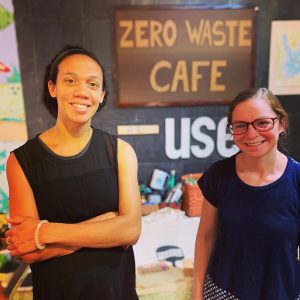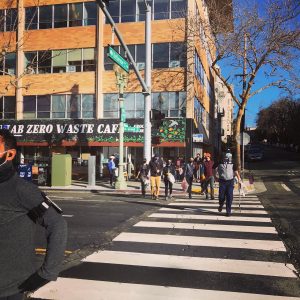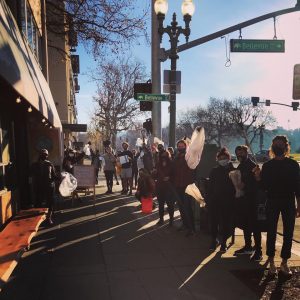What if everyone did their own dishes?

Vanessa Pope is a teacher, mother, and zero-waste advocate with ReThink Disposable. Her book “15 Minute First Dates” helps folks learn to live in harmony with the planet by shifting priorities and making time for the important parts of daily life. She is the founder and Executive Director of “For Here, Please”, a non-profit that helps businesses phase out single-use plastics. She is also founder of MudLab, the Bay Area’s first zero-waste cafe and grocery store. She lives in Philadelphia with her partner and young son. Here, she shares her thinking behind her fascinating organizations.
—————————————————–
Harvard, somewhat ridiculously, hires (or they did from 2003-2007) students to clean the bathrooms of fellow students. The work is called “dorm crew” and let me tell you it is entirely weird to haul a cleaning bucket into the suite of fellow students– some of whom are watching TV in the common area — and then proceed to scrub their toilets. I only lasted three days at that job, scratching my head in disbelief for ever taking the job in the first place. To this day, I still wonder why on earth college students can’t clean up after themselves.
After college, I bounced around from one service sector job to another as I tried to piece together a career in film production. I ended up working in catering at LACMA which eventually led to me starting an underground dining club called EndGrain. The idea of the club was that you brought your own dish and did your own dishes at the end — returning dignity to the service industry and putting everyone on equal footing by letting everyone coordinate their own meal. My dream was to eventually take it a step further with a pedal powered conveyor system to bring food to clients and a communal dishwashing area for all guests on their way out. I still adhere to the theory that if folks did their own dishes/dirty work, they would make less of a mess in the first place.

About a year ago, I became the owner of a zero-waste cafe and grocery store (MudLab). As the only manager on duty most days, I make coffee drinks, do dishes, clean the bathroom, sort items and generally pitch in. I’ve noticed something about being the owner of the cafe: since I’m able to leave at any time, I’m no longer as bothered to do a bit of what some might consider “dirty work”. We have also structured MudLab to minimize traditional serving tasks (we have a bus tub and people clear their own dishes). We try to keep the barista tasks simple and professional: folks order drinks, we pour them, and then dirty dishes are run through a dishwasher.
The service industry is fundamentally flawed for several reasons. When your wage (i.e. tips) is dependent on how much you’re willing to bend over backwards for a customer, it adds a level of stress that is not present in other work. We don’t take tips at MudLab because we realized that on slow days the baristas were barely making ends meet. Instead, we have a small service fee attached to all purchases, and if someone complains about it, well, then we are just not their kind of store.

Again and again we see in the environmental movement the situation of one company making a big mess, and then another coming along to clean it up. One could argue that this sort of dirty production fuels innovation and job creation. And ofcourse it gives way for wonderful organizations like ReThink Disposable to exist. The problem is that right now, it is in imbalance. We have too many mess creators and not enough mess eliminators.
What about service to the world though? If every business was responsible for all the packaging they created at the end of it’s useful life– what would that look like? How much money would it take to clean up all the CocaCola packaging in the world’s oceans? And multiply that times all the billions of pounds of Amazon packaging ending up in the trash each year. We know that someone can afford to clean them up– but when will they be held accountable for their creation. Doing things the fastest, easiest way does indeed bring huge profits– but with huge profits comes a huge amount of trash to deal with.
At MudLab we are starting small with the humble cup of coffee. We ask each and every guest to bring their own mug– in order to help people understand the inputs needed to bring them their coffee. But really, it is a way to start a larger conversation: how can we start to hold all businesses accountable for their outputs?
Want to connect with Vanessa? Connect with her on LinkedIn
